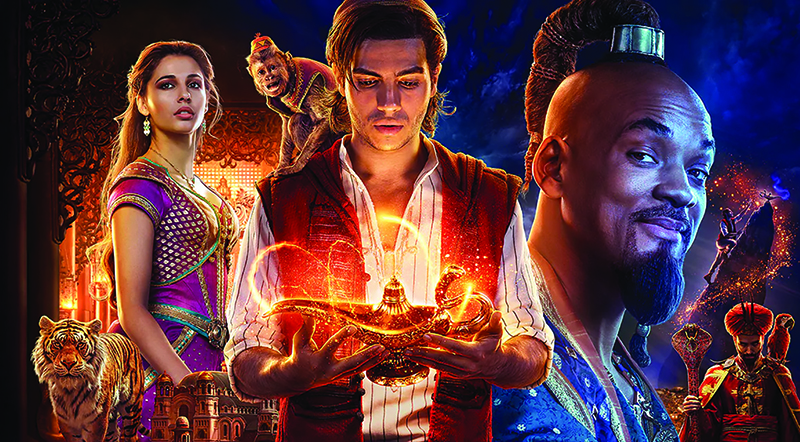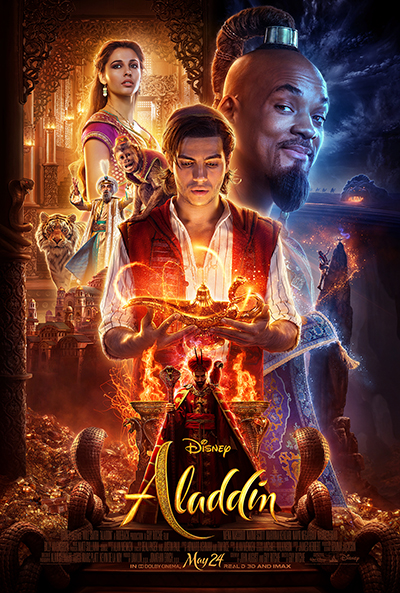Aladdin – Rubbing the remake lamp for big returns

by Ted Giese
Aladdin is the story of a “diamond in the rough” thief and street urchin. Living in the fictional Arabian port city of Agrabah, Aladdin is in a struggle with Jafar, the Sultan’s Grand Vizier, for control of a magic lamp and its powerful Genie as he falls in love and uses his wishes to win the heart of the Sultan’s daughter Princess Jasmine. The Princess, however, is more interested in finding her voice and succeeding her father on her own merits than she is in finding a prince to marry.
Throw in a wisecracking handmaiden Dalia and old favourites like Abu the kleptomaniac monkey, the Magic Carpet, Rajah the tiger, and Iago, Jafar’s talking parrot, and 2019’s Aladdin checks off all the nostalgia boxes needed to make a live action remake of the 1992 animated Disney feature with a couple of new fun twists. The remake retains the memorable musical set pieces from the original: “Friend Like Me,” “Prince Ali” and the Oscar-winning song “A Whole New World”—albeit with a couple of Bollywood and Will Smith hip-hop flourishes along the way.
Both the 1992 original and the new film are loosely based on “Aladdin and the Magic Lamp,” a tale featured in an early 18th century addition to the older 14th century collection of Arabic fairy tales called The Book of One Thousand and One Nights.
 Disney’s take on Aladdin is about as faithful to the source material as it has been with European folk tales. With Aladdin, as in many adaptations, Disney softens the depiction of the cultural setting because it is a family film meant primarily for children. The result is an idealized Arabic culture with a modernized and westernized story wherever it suits them. For example, while the story is set approximately in a 9th century AD Islamic port city, a brief scene early in the film shows girls taking lessons in a school taught by a woman teacher. Such opportunities may not have been available at that time.
Disney’s take on Aladdin is about as faithful to the source material as it has been with European folk tales. With Aladdin, as in many adaptations, Disney softens the depiction of the cultural setting because it is a family film meant primarily for children. The result is an idealized Arabic culture with a modernized and westernized story wherever it suits them. For example, while the story is set approximately in a 9th century AD Islamic port city, a brief scene early in the film shows girls taking lessons in a school taught by a woman teacher. Such opportunities may not have been available at that time.
Through Princess Jasmine the film also includes other Western feminist ideals which could be alien to the culture or time in which the fictional story is set. (A new song in the 2019 film, “Speechless,” has Princess Jasmine singing lines like: “I won’t be silenced, you can’t keep me quiet, won’t tremble when you try it, all I know is I won’t go speechless.”) These modern touches are not present in the original versions of the story, nor the 1992 film.
In the same way, Aladdin—though a thief—the thief is never threatened with having his hand cut off for stealing, which is the punishment recommended by the Qur’an in verse 5:38, “[As for] the thief, the male and the female, amputate their hands in recompense for what they committed as a deterrent [punishment] from Allah. And Allah is Exalted in Might and Wise.”
These changes and modern Western adaptations may not be well received in predominantly Muslim regions, even though Disney hired cultural consultants and spent a great deal of care to ensure all the key actors have ethnicities rooted in places like Tunisia, Turkey, Iran, Egypt, Iraq and India. In recent years Disney has taken care to be more culturally sensitive with this particular film property even changing lyrics in the 1992 film’s opening song “Arabian Nights” in subsequent releases of the film on VHS, DVD, Blu-Ray and streaming services. This is all the more interesting when considering that “Aladdin and the Magic Lamp” may not even have an Arabic source and might be nothing more than 18th century “fan fiction.”
The tale may actually be the product of 18th century Orientalism, since archaeologist and first translator of the tales, Antoine Galland, appears to be the first person to write down the story. Allegedly based on a story told to him by a Maronite monk in Aleppo, Syria, Arabic-language versions of “Aladdin and the Magic Lamp” only begin appearing after it was published in French in 1710. While works included in Arabian Nights like “The Seven Voyages of Sinbad the Sailor” are authentically translated from original sources, “Aladdin and the Magic Lamp” may actually be the creation of Galland, simply drawing on Middle Eastern motifs and themes.
Whether an authentically “Arabian” tale or not, it is clear that Disney has incorporated new ideas into the original story. Why? It is hard to know if these changes are artistic, ideological, or financial choices. Are they made to make inroads into the Arabic world or to placate Western liberal revisionist ideas about Arabic culture? Or are they intended to influence Arabic culture subversively?
it is clear that Disney has incorporated new ideas into the original story. Are they made to make inroads into the Arabic world or to placate Western liberal revisionist ideas about Arabic culture? Or are they intended to influence Arabic culture subversively?
If anything, these questions can highlight the precarious cultural minefield a retelling of Aladdin presents today. It’s legitimate to ask: why make a potentially controversial live action version of the 1992 cartoon?
Disney’s early live-action remakes (from 1998’s 101 Dalmations to 2010’s Alice in Wonderland), while not as good as the originals, have nevertheless proven lucrative for Disney. It’s not surprising, therefore, that Disney ramped up such productions in recent years. Since 2014, we have seen remakes or twists on classics like Sleeping Beauty (with Maleficent), Cinderella, The Jungle Book, Beauty and the Beast, and even Winnie the Pooh (in Christopher Robin). This year the remakes have hit a breakneck pace Dumbo in March, Aladdin in May, The Lion King in July, a sequel to Maleficent in October, and Lady and the Tramp in November. Will the movie-going public have the appetite for this glut of nostalgia long term? Or is this hard sprint a sign that Disney knows the nostalgia finish line is right around the corner—a kind of “make hay while the sun is shining” attitude as dusk approaches on the current nostalgia fever?
After watching Aladdin, the Christian family will want to review and talk about the Seventh Commandment: You shall not steal. “What does this mean?” Luther asks, before explaining: “We should fear and love God so that we do not take our neighbour’s money or possessions, or get them in any dishonest way, but help him to improve and protect his possessions and income.”
In the film theft is glamorized with a lot of flash and dazzle. At the same time, the seriousness of the crime is downplayed due to a lack of consequences. Aladdin comes out on top and his initial life of crime is excused because of his poverty.
In the film theft is glamorized with a lot of flash and dazzle. At the same time, the seriousness of the crime is downplayed due to a lack of consequences.
Worth noting here is that Martin Luther in his Large Catechism is as critical of the rich thief, who takes what isn’t his in a way that only appears right, as much as he is of the small-time crook. We get an example of the “rich thief” with Aladdin’s villainous Grand Vizier Jafar. The majority of his actions are done in secret as he schemes to obtain and even expand the kingdom for himself through unprovoked warfare against Princess Jasmine’s grandfather’s neighbouring kingdom. At one point Jafar, who once was a street urchin like Aladdin, says to Aladdin, “Steal an apple, you’re a thief. Steal a kingdom, you’re a statesman.” By including a back story to Jafar this version makes him into a cautionary character warning Aladdin of what he could become if he becomes drunk on the power of the magic lamp and what the wishes might give him.
In the end Aladdin provides a positive example of following the 5th and 7th commandments when he finally makes good on his promise to use his last wish to release the Genie from his imprisonment—showing he truly wants to help and support the Genie in every physical need and allow him to have a human life where he can have possessions and income of his own along with a wife and family. Aladdin is also supportive of Princess Jasmine becoming the Sultan.
In sum, the movie, while wooden in parts and perhaps a bit too melodramatic, is not without its charm and fun moments.
———————
Rev. Ted Giese is lead pastor of Mount Olive Lutheran Church, Regina, Saskatchewan, Canada; a contributor to The Canadian Lutheran, Reporter; and movie reviewer for the “Issues, Etc.” radio program. Follow Pastor Giese on Twitter @RevTedGiese.





